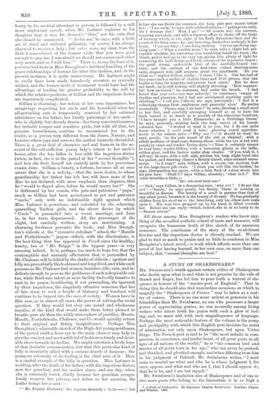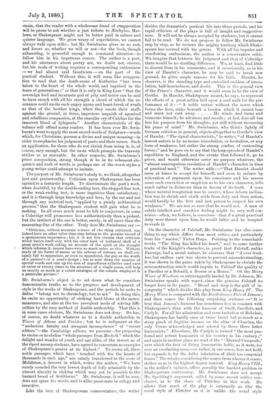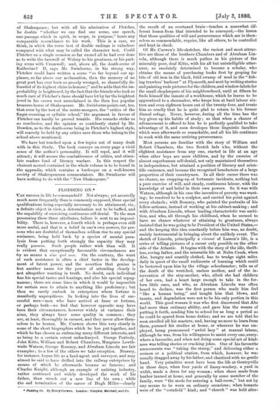A STUDY OF SHAKESPEARE.*
Mn. SWINBURNE'S wrath against certain critics of Shakespeare who decide upon what is and what is not genuine by the rule of thumb and finger, has led him to pour forth a torrent of elo- quence in honour of the "master-poet of England." That in doing this he should also find numberless occasions on which to magnify the "Shakespeare of Prance" may be taken as a mat- ter of course. There is no one more ardent or generous in his friendships than Mr. Swinbarne, no one who possesses a larger power of appreciating genius, no one assuredly among living writers who utters forth his praise with such a glow of feel- ing, and, we must add, with such magniloquence of language. Perhaps the most noticeable feature of the volume is the pomp and prodigality with which this English poet lavishes his notes of admiration not only upon Shakespeare, but upon Victor Hugo. The French poet is said to be "the most infinite in com- passion, in conscience, and tender heart, of all great poets in all ages of all nations of the world ;" he is "the common lord and master of all poets born in his age," who can never be praised, and thanked, and glorified enough; and when differing from him in his judgment of Falstaff, Mr. Swinburne writes, "I need none to remind me what and who he is whose judgment I, for once, oppose, and what and who am I, that I should oppose it; that he is he, and I am but myself."
Mr. Swinburne's laudation also of Shakespeare and of one or two more poets who belong to the Immortals is in so high a
• A Study of 84atespeare. By Algernon Charles SwInbume. London: Matto and WIndus. 1880.
strain, that the reader with a wholesome dread of exaggeration will be prone to ask whether a just tribute to 2Eschylus, Mar- lowe, or Shakespeare might not be better paid in calmer and quieter language. We grow weary of superlatives, we cannot always walk upon stilts ; but Mr. Swinburne gives us no rest, and forces us, whether we will or not—for the book, though exhausting, is powerful enough to command attention—to follow him in his impetuous course. The author is a poet, and his utterances about poetry are, we doubt not, sincere, but his mode of writing requires a corresponding enthusiasm — we had almost said fanaticism — on the part of the poetical student. Without this, it will seem like exaggera- tion to read that the death-scene of Katherine "has been taken to the heart of the whole world, and baptised in the tears of generations ;" or that it is only in King Lear "that the sovereign lord and incarnate god of pity and terror can be said to have struck with all his strength a chord of which the re- sonance could excite such angry agony and heart-break of wrath as that of the brother kings, when they smote their staffs against the ground, in fierce, imperious anguish of agonised and rebellious compassion, at the oracular cry of Calchas for the innocent blood of Iphigenia." Another characteristic of the volume will offend many readers. It has been ever Mr. Swin- burne's wont to apply. the most sacred words of Scripture—words which, for Christians, possess a divine and unique meaning—in order to emphasise his judgment of poets and their verses. Such an application, for those who do not shrink from using it, is, of course, easy enough, but the taste which prompts the travesty strikes us as execrable. In other respects, Mr. Swinburne's prose composition, strong though it be in its vehement elo- quence and rush of words, is perhaps one of the worst styles a young writer could attempt to imitate.
The purport of Mr. Swinburne's study is, we think, altogether just and praiseworthy. Criticism upon Shakespeare has been carried to a fantastic length. To discriminate the poet's work, when doubtful, by the double-ending test, the stopped-line test, or the weak-ending test, is more ingenious than satisfactory ; and it is through large knowledge and love, by the ear and not through any metrical test, "applied by a purely arithmetical process," that the Shakespeare student will gain what he is seeking. In all cases much must be left to conjecture, in some a Coleridge will pronounce less authoritatively than a pedant, but the instinct of the one is better, surely, in all cases than the measuring-line of the other. Truly does Mr. Swinburne say :—
"Criticism, without accurate science of the thing criticised, can indeed have no other value than may belong to the genuine record of a spontaneous impression ; but it is not less certain that criticism which busies itself only with the outer husk or technical shell of a great artist's work, taking no account of the spirit or the thought which informs it, cannot have even so much value as this. Without study of his forms of metre or his scheme of colours, we shall cer- tainly fail to appreciate, or even to apprehend, the gist or the worth of a painter's or a poet's design ; but to note down the number of special words and cast up the sum of superfluous syllables used once or twice or twenty times in the structure of a single poem, will help us exactly as much as a naked catalogue of the colours employed in a particnlar picture."
Mr. Swinburne's object is to set down what he considers demonstrable truths as to the progress and development of style in the works of Shakespeare, and the periods he seeks to define "belong not to chronology, but to art." In doing this, he omits no opportunity of striking hard blows at the metre- measurers, and also at the too prevalent mode of solving diffi- culties by the easy method of double authorship. That this is in some cases obvious, Mr. Swinburne does not deny. He has, of course, no doubt whatever as to a double authorship in Timon of Athens and Pericles; but he is indignant at the "audacious fatuity and arrogant incompetence" of "recent editors "—the Cambridge editors, we presume—for proposing to excise or to obelise "whole passages from Macbeth" which the delight and wonder of youth and age alike, of the rawest as of the ripest among students, have agreed to consecrate as examples of Shakespeare's genius at its highest." To crown all, these noble passages, which have "touched with fire the hearts of thousands in each age," are calmly transferred to the score of Middleton, a descent in which, writes the author, "We have surely sounded the very lowest depth of folly attainable by the utmost alacrity in sinking which may yet be possible to the bastard brood of Scriblerus." Mr. Swinburne, it will be seen, does not spare his words, and is alike passionate in eulogy and invective.
Like the best of Shakesperean commentators, the writer divides the dramatist's poetical life into three periods, and his rapid criticism of the plays is full of insight and suggestive- ness. It will not be always accepted by students, but it cannot fail to be read. We do not propose to follow Mr. Swinburne step by step, as he reviews the mighty territory which Shake- speare has covered with his genius. With all his impulse and overflowing enthusiasm, the author is a conservative critic. We imagine that between his judgment and that of Coleridge there would be no startling difference. We, at least, find little to dissent from in his comments, and if occasionally, as in his view of Hamlet's character, he may be said to break new ground, he gives ample reasons for his faith. Hamlet, he observes, is the standing type and embodied emblem of irreso- lution, half-heartedness, and doubt. This is the general view of the Prince's character, and it would seem to be the view of Goethe. In Hamlet, Shakespeare meant, he says, to represent the effects of a great action laid upon a soul unfit for the per- formance of it :—" A noble nature without the nerve which forms the hero, sinks beneath a burden which it cannot bear and must not cast away He winds and turns and torments himself; he advances and recoils ; at last does all but lose his purpose from his thoughts, yet still without recovering his peace of mind." Mr. Swinburne, who thinks lightly of German criticism in general, objects altogether to Goethe's view of Hamlet. "The signal characteristic," he writes," of Hamlet's inmost nature is by no means irresolution, or hesitation, or any form of weakness, but rather the strong conflux of contending forces ;" and he goes on to say that the long episode of Hamlet's expedition to England, and the events that followed it, go to. prove, and would otherwise serve no purpose whatever, the "almost unscrupulous resolution of Hamlet's character in time of practical need." The writer adds :—" That Hamlet should seem at times to accept for himself, and even to enforce by reiteration of argument upon his conscience and his reason some such conviction or suspicion as to his own character, tells much rather in disfavour than in favour of its truth. A man whose natural temptation was to swerve, whose inborn inclina- tion was to shrink and skulk aside from duty and from action,. would hardly be the first and last person to suspect his own weakness." We are not so sure that he would not. A man of subtle intellect and sensitive feeling might be very well con- scious—often, we believe, is conscious—that if a great practical duty were thrust upon him, lie would falter and be tempted to evade it.
On the character of Falstaff, Mr. Swinburne has also some- thing to say which differs from most critics, and particularly from his "master," Victor Hugo. Pointing to the remarkable words, "The King has killed his heart," and to some further traits of the Knight's character, in proof that Falstaff, unlike Panurge, had a moral nature, he observes that "if ever fruit- less but endless care was shown to prevent misunderstanding„ it was shown in the pains taken by Shakespeare to obviate the. misconstruction which would impute to Falstaff the quality of a Parolles or a Bobadil, a Bessus or a Moron." Of the Merry Wives of Windsor, so extravagantly lauded by Dr. Johnson, Mr. Swinburne speaks with regret, since the genuine Falstaff no longer lives in its pages. "Broad and deep is the gulf of in- congruity" which divides this play from King Henry IV. The Merry Wives is compared with the Bartholomew Fair of Jonson ; and then comes the following surprising sentence :—" It is true that Jonson's humour has sometimes less in common with Shakespeare's than with the humour of Swift, Smollett, and Carlyle. For all his admiration and even imitation of Rabelais, Shakespeare has hardly once or twice burnt but so much as a stray pinch of fugitive incense on the altar of Cloacina, the only Venus acknowledged and adored by those three latter hnmourists." Elsewhere, Mr. Carlyle is termed "the most pro- found and potent humourist of his country in his century ;" and again in another place we read of the " Eternal Cesspools? over which the first of living humourists holds, as it were, for ever an everlasting nose,—or rather, in one sense, does not hold,. but expands it, for the fuller inhalation of their too congenial fumes." The rebuke, considering the source from whence it comes, strikes us as in the highest degree comical. King Henry VIII., in the author's opinion, offers possibly the hardest problem in Shakcsperean controversy. Mr. Swinburne does not accept Mr. Spedding's argument, called by some recent critics con- clusive, as to the share of Fletcher in this work. He allows that much of the play is externally as like the usual style of Fletcher as it is unlike the usual style
of Shakespeare ; but with all his admiration of Fletcher, lie doubts "whether we can find one scene, one speech, one passage which in spirit, in scope, in purpose," bears any comparable resemblance to his work. This is a case, we think, in which the verse test of double endings is valueless- compared with what may be called the character test. Could Fletcher on a single occasion so far exceed all he had ever done as to write the farewell of Wolsey to his greatness, or his part- ing scene with Cromwell ; and, above all, the death-scene of Katherine ? If, says Mr. Swinburne, in his strong way, 'Fletcher could have written a scene "so far beyond our ap- plause, so far above our acclamation, then the memory of no great poet has over been so grossly wronged, so shamefully de- frauded of its highest claim to honour;" and he adds that the im- probability is heightened, by the fact that the friends who took so much care of Fletcher's fame shoal have let by far the brightest jewel in his crown rest unreclaimed in the then less popular treasure-house of Shakespeare. Mr. Swinburne points out, too, that even by the test of the metre-mongers, the "critics of the Sager-counting or syllabic school," the argument in favour of Fletcher can hardly be proved tenable. His remarks strike us .as conclusive, and the opinion so confidently stated by Mr. Dowden, as to the death-scene being in Fletcher's highest style, will scarcely be held by any critics save those who belong to the school above mentioned.
We have but touched upon a few topics out of many dealt with in this Study. The book conveys on every page a vivid sense of the author's personality. It will repel, and it will attract ; it will arouse the combativeness of critics, and stimu- late readers fond of literary warfare. In this respect the choicest morsel contained in the whole volume is to be found in the appendix, which contains a burlesque on a well-known society of Shakespearean commentators. Mr. Swinburne will have nothing to do with the "New Shakespeare."




































 Previous page
Previous page